
Mires and Peat
Scope & Guideline
Illuminating the Vital Role of Mires in Nature
Introduction
Aims and Scopes
- Ecological Assessment of Peatlands:
Research articles often emphasize the biodiversity and ecological health of peatland environments, assessing the impacts of anthropogenic activities and natural disturbances on species diversity and ecosystem functionality. - Restoration and Management Practices:
The journal frequently features studies on restoration techniques and management strategies aimed at rehabilitating degraded peatlands, including paludiculture and innovative land-use practices that support ecological balance. - Climate Change Impact Studies:
A significant focus is placed on understanding how climate change affects peatland carbon dynamics, including methane emissions and carbon storage potential, which are critical for global climate models. - Hydrological Studies:
Research often investigates the hydrology of peatlands, including water table dynamics, drainage effects, and hydrometeorological observations, which are essential for understanding peatland functionality. - Socio-Ecological Dimensions:
The journal also highlights the social aspects of peatland management, including community perceptions, livelihood strategies, and the integration of local wisdom into peatland restoration efforts.
Trending and Emerging
- Paludiculture and Sustainable Agriculture:
There is a growing emphasis on paludiculture, which promotes sustainable agricultural practices on peatlands. This trend highlights the importance of integrating agricultural productivity with peatland conservation. - Carbon Dynamics and Climate Mitigation:
Research focusing on carbon emissions, storage, and the role of peatlands in climate change mitigation has gained prominence, particularly as global awareness of climate issues increases. - Community Engagement in Restoration Efforts:
Emerging studies are exploring the role of local communities in peatland restoration, emphasizing participatory approaches and the importance of incorporating local knowledge and practices. - Technological Innovations in Peatland Research:
The use of advanced technologies such as remote sensing, unmanned vehicles, and 3D mapping for peatland assessment and monitoring is increasingly featured, showcasing the integration of technology in ecological research. - Ecological Responses to Land Use Changes:
There is a rising interest in understanding how land use changes, such as oil palm cultivation and drainage, affect peatland ecosystems, particularly regarding biodiversity and carbon dynamics.
Declining or Waning
- Historical Peatland Management Studies:
There has been a noticeable decrease in publications focusing on historical management practices of peatlands, suggesting a shift towards contemporary restoration and management strategies that prioritize current ecological challenges. - Purely Taxonomic Studies:
Studies that solely focus on the taxonomy of peatland species without addressing their ecological roles or conservation status have become less frequent, indicating a trend towards more integrative research approaches. - Local Case Studies without Broader Implications:
Research that presents localized case studies without exploring their broader implications for peatland science or management has diminished, reflecting a shift towards studies that provide insights applicable to wider contexts.
Similar Journals

Forest Ecosystems
Empowering voices in the realm of forest science.Forest Ecosystems is a prestigious open access journal published by KEAI PUBLISHING LTD, dedicated to advancing knowledge in the fields of forestry, ecology, and conservation. Established in 2014 and located in Beijing, China, this journal has rapidly gained prominence, achieving Q1 status in multiple categories, including Ecology, Evolution, Behavior and Systematics, and Forestry in 2023. With an impressive rank of 19 out of 174 in the Scopus category of Agricultural and Biological Sciences - Forestry, it stands in the 89th percentile, reflecting its influential contributions to the field. The journal fosters scholarly discourse and disseminates innovative research aimed at understanding forest ecosystems and their vital role in our environment. Offering a robust platform for researchers, professionals, and students, Forest Ecosystems ensures accessibility through its open access format, enabling a wider audience to engage with and benefit from cutting-edge research dedicated to the stewardship of forest resources.

BOREAL ENVIRONMENT RESEARCH
Championing Research for a Resilient Boreal EnvironmentBOREAL ENVIRONMENT RESEARCH is a noteworthy academic journal published by the Finnish Environment Institute. Focusing on interdisciplinary studies within the realms of Agricultural and Biological Sciences, Atmospheric Science, Ecological Modeling, and Pollution, the journal aims to foster research that contributes to an improved understanding of boreal ecosystems and their interactions with global environmental changes. With an H-Index indicating a significant impact in the field and a convergence period extending from 1996 to 2024, BOREAL ENVIRONMENT RESEARCH serves as a platform for researchers, professionals, and students alike, promoting high-quality, peer-reviewed articles that address pressing environmental issues. Although it operates on a subscription basis, the journal's robust categorization within Q3 and Q4 quartiles highlights its relevance and commitment to facilitating academic dialogue and collaboration. Located in Helsinki, Finland, this journal stands as a vital resource for those dedicated to understanding and addressing the complex challenges faced by boreal environments.
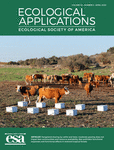
ECOLOGICAL APPLICATIONS
Innovative insights driving ecological management.ECOLOGICAL APPLICATIONS, published by WILEY, is a leading journal in the field of ecology, providing a platform for innovative research that addresses the understanding and management of ecological systems. With an ISSN of 1051-0761 and E-ISSN of 1939-5582, it has established itself as a vital resource for ecologists and environmental scientists since its inception in 1991. Ranked in the top quartile (Q1) for Ecology in 2023 and with a Scopus ranking of 40 out of 461 in Environmental Science, ECOLOGICAL APPLICATIONS boasts an impressive impact factor, attesting to its significance and influence in the field. The journal's mission is to publish peer-reviewed articles that contribute to ecological theory and its applications in conservation and environmental management. Researchers, professionals, and students alike will find invaluable insights and the latest developments in ecological research through its comprehensive scope and rigorous scholarship, ensuring a crucial role in shaping future ecological practices and policies.

BIOLOGICAL INVASIONS
Navigating the intricate web of ecosystem dynamics.BIOLOGICAL INVASIONS, published by Springer, stands at the forefront of ecological research, providing a vital platform for studies related to invasive species and their impacts on biodiversity and ecosystem dynamics. With an impressive impact factor reflecting its high-quality contributions, this esteemed journal has established itself in the Q1 category in both Ecology and Ecology, Evolution, Behavior and Systematics, highlighting its significance within these fields. The journal is indexed in the renowned Scopus database, ranking 113th out of 721 in Agricultural and Biological Sciences, and 82nd out of 461 in Environmental Science, affirming its importance and reach among ecological research. Since its inception in 1999, BIOLOGICAL INVASIONS has published cutting-edge research, fostering a deeper understanding of the dynamics of species invasions and their ecological consequences. While it does not currently offer Open Access, researchers, professionals, and students will find invaluable insights and the latest advancements in biodiversity conservation, ecosystem management, and invasion biology within its pages. This journal serves as an essential resource for those committed to addressing the challenges posed by biological invasions, making it a cornerstone in ecological literature.
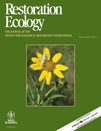
RESTORATION ECOLOGY
Fostering Global Dialogue on Biodiversity ConservationRESTORATION ECOLOGY is a leading international journal dedicated to the science and practice of ecological restoration, published by WILEY. With an ISSN of 1061-2971 and a robust E-ISSN of 1526-100X, this journal has successfully positioned itself within the top quartiles (Q1) in significant categories such as Ecology, Evolution, Behavior and Systematics, and Nature and Landscape Conservation, showcasing its high-impact contributions to these vital fields. RESTORATION ECOLOGY has been actively disseminating critical research since 1993 and continues to thrive as it converges toward 2024. Ranked impressively within Scopus, it stands at #98 out of 721 in Agricultural and Biological Sciences and #30 out of 211 in Environmental Science, emphasizing its substantial influence and reach. While the journal operates under traditional access guidelines, it serves as an invaluable resource for researchers, professionals, and students alike, aiming to advance knowledge and practical solutions for biodiversity conservation and ecosystem rehabilitation globally. For those interested in the intersection of ecological theory and practical restoration applications, RESTORATION ECOLOGY is a key outlet for fostering dialogue and collaboration.

NEW FORESTS
Exploring Innovations in Forest Management.NEW FORESTS, published by SPRINGER, stands at the forefront of forestry research, delivering cutting-edge insights into forest science, management, and conservation. With an ISSN of 0169-4286 and an E-ISSN of 1573-5095, this esteemed journal has earned a distinguished reputation as it continues to contribute significantly to the field since its inception in 1986. As evidenced by its impressive ranking in the Q1 category for Forestry and being positioned at #32/174 in the Scopus Ranks for Agricultural and Biological Sciences, NEW FORESTS maintains an 81st percentile standing, emphasizing its influential role in advancing scientific discourse. The journal focuses on a diverse array of topics within the realm of forestry, making it an essential resource for researchers, professionals, and students eager to engage with contemporary developments and challenges in forest ecosystems. Although it is not an open-access journal, access to its articles can be facilitated through various academic institutions and libraries, ensuring that vital research is available to a broad audience. As we look toward the future, NEW FORESTS continues to strive for excellence, fostering dialogue and collaboration among scholars committed to sustainable forest management and restoration until at least 2024.
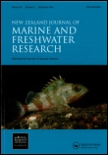
NEW ZEALAND JOURNAL OF MARINE AND FRESHWATER RESEARCH
Illuminating the Path to Sustainable Aquatic ResourcesNEW ZEALAND JOURNAL OF MARINE AND FRESHWATER RESEARCH, published by Taylor & Francis Ltd, stands as a distinguished platform for the dissemination of innovative research in the realms of aquatic science and ecology. With an ISSN of 0028-8330 and E-ISSN 1175-8805, this journal has been curating significant scientific contributions since its inception in 1967, continuing through to 2024. Recognized in the Q2 category across multiple relevant fields—including Aquatic Science, Ecology, and Water Science—this journal ranks notably in Scopus, with a 74th percentile for Ecology, Evolution, Behavior and Systematics, highlighting its impact and relevance within the scientific community. Though not an open-access publication, its rigorous peer-reviewed articles offer insights that resonate with researchers, professionals, and students who are passionate about advancing our understanding of freshwater and marine ecosystems. By fostering a collaborative space for ecological and environmental inquiries, the NEW ZEALAND JOURNAL OF MARINE AND FRESHWATER RESEARCH is essential for those aiming to contribute to the vital conversations around biodiversity, conservation, and sustainable management of aquatic resources.
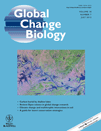
GLOBAL CHANGE BIOLOGY
Exploring the Interconnections of Life and ClimateGLOBAL CHANGE BIOLOGY, published by Wiley, is a leading journal dedicated to advancing the scientific understanding of the relationships between biological systems and global environmental changes. With an impressive impact factor placing it in the Q1 category across multiple disciplines—including Ecology, Environmental Chemistry, and Global and Planetary Change—this journal is essential for researchers, professionals, and students aiming to stay at the forefront of this dynamic field. The journal has a rich history since its inception in 1995, continually providing a platform for high-quality research that informs policy and management practices worldwide. Although it is not open access, the journal remains a valuable resource for those committed to exploring the complexities of ecological and environmental change. With a Scopus ranking of #3 in Global and Planetary Change and #6 in both Ecology and Environmental Chemistry, GLOBAL CHANGE BIOLOGY continues to shape the dialogue on the pressing environmental challenges of our time.
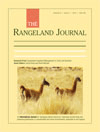
RANGELAND JOURNAL
Advancing Knowledge for Sustainable LandscapesRangeland Journal, published by CSIRO PUBLISHING, stands as a pivotal resource within the fields of ecology and environmental science. With an ISSN of 1036-9872 and an E-ISSN of 1834-7541, this journal has been disseminating critical research findings from 1998 to 2024, particularly focusing on the intricate dynamics of rangelands and their ecological significance. The journal is recognized for its contributions to the Q3 category in both Ecology and Ecology, Evolution, Behavior and Systematics, demonstrating its relevance in advancing scholarly discourse among researchers and professionals alike. Furthermore, with Scopus ranking it in the 57th percentile within its respective categories, the Rangeland Journal serves as an essential platform for fostering academic exchange and promoting sustainable management practices in rangeland environments. While currently not an open-access publication, it remains a vital institution for those dedicated to the stewardship and study of these unique landscapes.
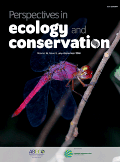
Perspectives in Ecology and Conservation
Fostering knowledge exchange in the realm of ecology and conservation.Perspectives in Ecology and Conservation, published by Elsevier Science Ltd, is a leading academic journal dedicated to advancing the fields of ecology, conservation, and environmental management. With a Q1 ranking in multiple categories, including Ecology, Management, Monitoring, Policy and Law, and Nature and Landscape Conservation, this journal boasts an impressive standing among its peers, making it essential reading for researchers and professionals. Since its inception in 2017 and running through 2024, it aims to provide innovative perspectives and critical analyses that enhance our understanding and practices in conservation science. The journal is accessible through open access options, facilitating broader dissemination of knowledge. Its commitment to addressing contemporary ecological challenges reinforces its importance in the academic community, promoting sustainable practices and informed policy-making in the face of urgent environmental issues.